
At long last "All Creatures Great and Small" breaks tradition . . . by giving Mrs. Hall some yuletide comfort and joy.
During Christmas parties past, we've seen the 1930s British housekeeper Audrey Hall (Anna Madeley) stood up by her estranged son Edward or left to handle the Skeldale House drudgery while everyone else celebrates. Despite her troubles, she always plasters on a smile while soothing and nourishing those around her. This time, however, she does something solely for herself. She lets go of misplaced loyalty to a long-absent husband and instead kisses her dedicated suitor Gerald Hammond (Will Thorp) – twice!
"Downright racy," series writer Ben Vanstone told Salon with a laugh. "We've seen she's had some pretty rubbish Christmases and we felt that Mrs. Hall deserved a good Christmas this year.
"She's always doing things for everyone else," he continued. "Gerald is always offering to bring her tea, to get her cake or do the washing up with her. He's always there for her in a way that other people aren't necessarily. So it felt the right time. Something that was broken was a little bit mended in her with Edward, and that allows her to take a little step forwards with Gerald."
While it took three seasons for Mrs. Hall to get some loving, it took just as long for devil-may-care Tristan Farnon (Callum Woodhouse) to earn everyone's respect – both at his older brother Siegfried's (Samuel West) veterinary practice and among the surrounding Yorkshire Dale farms. Yes, Tristan had eventually proven himself as a capable veterinarian, but Siegfried had always been the disapproving holdout. With Britain entering the war against Germany, Tristan decides to go and serve his country, and Siegfried reluctantly respects this choice.
"Alf Wight makes a conscious decision not to dwell too much on the war actually in his book."
Perhaps this is what also earns Tristan the honor of making the Christmas dinner toast. He speaks eloquently about missing family and giving thanks to those who fill that hole, concluding with, "The only thing left to say is Merry Bloody Christmas!"
"That's what Siegfried says in Series 1," said Vanstone. "It's nice to see Tristan trying to be grown-up in a way, to offer up some honest emotions and trying to say what he truly feels about his brother, which they never do. They always dance around each other through the series, and it felt like the right opportunity for him to.
"And then 'Merry Bloody Christmas,' I think it's something we do a lot in 'All Creatures.' Where there's moments of sentimentality, we will always try and undercut them somehow so it doesn't feel too saccharine. It's a very British thing as well, actually. If we ever get too close to be honest with our emotions and feelings we'll automatically revert to humor to undercut ourselves."
Both of these major character shifts – Mrs. Hall coming out of her servile shell and Tristan taking responsibility – come about with the advent of World War II for Britain on Sept. 3, 1939 in the series. Although it was a distant reality in the books by Alf Wight on which the "Masterpiece" series is based, it was a deliberate decision on the production's part to show how even the verdant Yorkshire Dales were affected by the sacrifices of war.
"I think it'd be very easy when you've got something that works to just just keep rolling with it," said Vanstone. "But we really felt that we wanted to push things on and find another gear with the characters this year and explore them a little bit further than we have done before."
Read on for the rest of the interview with Vanstone, who discusses Mrs. Hall's reunion with her son, Tristan's growth, Christmas during wartime and of course, animals.
The following has been lightly edited for length and clarity.
You pulled a bit of a bait and switch saying there wouldn't be a Christmas party and then having Mrs. Hall put one together anyway. Was there a discussion about not doing a party considering the war situation?
Just in terms of things being short, like food rationing, it was not a time for largesse. People are being sent off to go and fight; it didn't feel quite right to be having a party at the same time. I'm sure there's lots of different varied responses to war breaking and I know that some people were partying really hard because why not? The world could end tomorrow. I think there's a whole range of different attitudes. We felt in the Dales and particularly our previous Christmas parties have felt very lavish. It didn't feel that it was a time for for lavishness.
In your research, what foods would've been in short supply during that time or seen as a luxury?
Lots of butter, sugar, all those sorts of things like flour were being rationed. Fuel. It gets more and more controlled. In the research we did, in the Dales, amongst the farming community, they still had their animals, they served their livestock, and they could still look after themselves in a way and give food and meet your neighbor who needed it. But it was taken under control by the government at some point in terms of produce, the way it was given out was taken control of centrally.
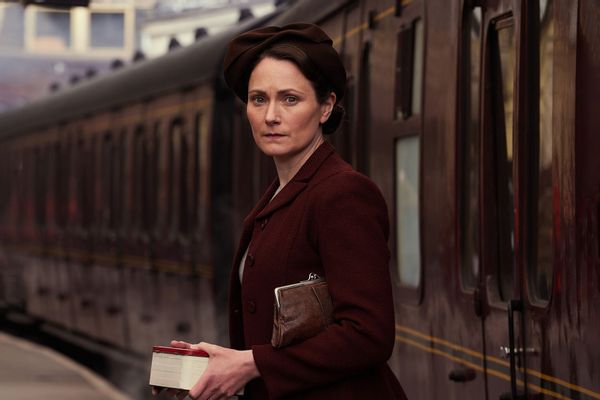
It felt important to me for Edward not just keep existing off screen. I always intended for Edward to appear at some point and Mrs. Hall having a chance to address her past with her son in a way that allows them to look forwards and give us some hope in that relationship. She's carried a lot of baggage with her, and if she's ever going to move forwards in life, I think she's been held back by her past.
"We see Mrs. Hall also gets nourishment. It's some self care for her."
This is a step along the way for Mrs. Hall, to some resolution with Edward. It's not fully there, and I think that we we won't ever fully know her story. We can all fill the gaps a little bit and then there's things that are alluded to. It almost doesn't need to be said to understand the harm and damage that's been done to her. We see her process it.
Part of the friction with Edward is that he had stolen from one of her employers she was doing housekeeping for, and she reported it. He ended up getting sent to a borstal, a reformatory for young offenders. As an American I'm only faintly aware of borstals. What is their reputation?
Not great even then. They're very harsh places for children to be sent. Mrs. Hall doesn't know that's what the end result result is going to be. She can see her son going off the rails and is desperate to get him back on the rails. She feels that by reporting this or not lying for him for whatever – I don't think she imagines that he'll be going to borstal. I think she hopes that the outcome from that will be that he realizes that he's going down the wrong path and rights himself. And then it doesn't go that way. He's sent to borstal, which is a terrible thing for him.
The ending train scene feels awkward but true. Despite a strained conversation, Edward all of a sudden offers his mum a last-minute hug and agrees to accept the biscuits she had baked him. But in the rush, he drops the tin, and later she ends up eating them by herself alone. What did you want to convey with that scene?
The biscuits, this was an idea that [the episode's writer Karim Khan] had very early on. The biscuits represent Mrs Hall's desire to nourish and care for her son, and Karim was very clear that he wanted Mrs. Hall to get the biscuits at the end. And so we see Mrs. Hall also gets nourishment. It's some self care for her at the end, the feeling that something that was broken has been improved.
Edward's final words to her are drowned out by the whistle as the train chugs away. But one of the volunteers who served Mrs. Hall tea is deaf and is able to read his lips. He had said, "I love you," back to his mother. Could you discuss using this device?
With regards to the the lost words at the train, throughout that episode Mrs. Hall has this relationship with a deaf volunteer. We wanted that character to have their place in the story, as well as wanting to make sure that we open up opportunities for people with disabilities. It was also about, "How does that person have agency in the story as well?"
The actor, Lara Steward, is deaf?
Yes, the tea ladies – both of them are profoundly deaf. We wanted to turn that into a way a superpower in a way. The whole story doesn't work without that character being able to lip read at the end. Mrs. Hall doesn't quite get what her son is saying. She's desperate to hear what he said. We think for a horrible moment, "Oh, no, she's never going to know," until our volunteer comes up and saves the day and tells her what he says.
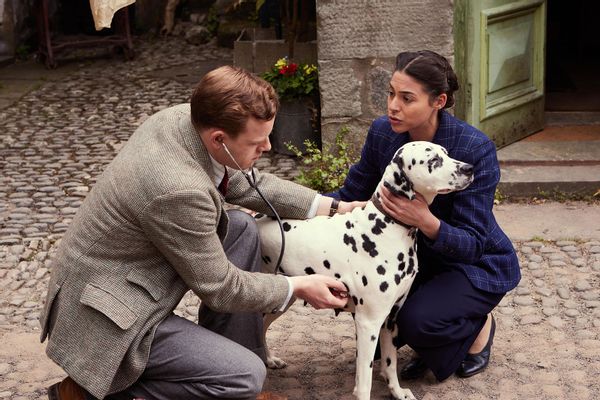
"In the past, we would have seen Tristan trying to dodge responsibilities and dodge work."
I think he's following Mrs. Hall's recipes. She's probably left him some pretty strict instructions on how to do things. But he turns out to be quite useful. The evolution of Tristan – when we first meet him he seems entirely hapless, and then as the series progresses, it feels like he grows into himself a little bit more. In the past, we would have seen Tristan trying to dodge responsibilities and dodge work, and it felt right for the story that actually, he's managed to pull this off pretty well.
That's what leads into the conversation with Siegfried – even when he's done a good job, it's not good enough for his brother. And this leads to the quite painful revelation about how Tristan came into Siegfried's care, which is brilliantly written by Karim Khan, a new new writer for Season 3. That's one of my favorite moments, as well, that honesty between the two – that Siegfried didn't want kids and then did did, but then it was too late. It certainly gives us more insights into the complication of the relationship with Tristan.
Surprising absolutely no one except for Tristan himself, Flo Pandhi (Sophie Khan Levy) turned down his rather impetuous marriage proposal. What was important about that storyline?
It felt like Tristan has the wrong hypothesis – he thinks that this is a solution, he's got to settle down and get married, like James (Nicholas Ralph) and Helen (Rachel Shenton). But actually there are far deeper problems, which Flo helps him realize – that he doesn't quite know who he is. And he doesn't quite know who he is because he's always been groomed by Siegfried and in Siegfried's shadow. I always think he's a bit like a pinball. He'd bounce off to this solution, and that'll fix things because that's who I should be without actually fully discovering who he truly is. So this felt like a big step for his character to realize that.
We can see that James really feels he should enlist, but it turns out that Tristan is the one to go off to war by the end. What were the considerations for whether or not these characters would leave the Dales for war?
We always knew that one or both the boys would be going at some point, right? We know what happens in 1939. And both Tristan and James in the book certainly signed up and joined. We felt that it would be impossible not to play that story in the moment, I think that being the characters they are that they would naturally have a sort of prick of conscience or feel the need to act.
As the series developed, it really felt that Tristan's character, he needs to go and find himself apart from Siegfried. And Siegfried probably needs to find himself apart from Tristan, because they've developed this unhealthy symbiosis in a way, and neither of them can move on and out of the roles that they're stuck in.
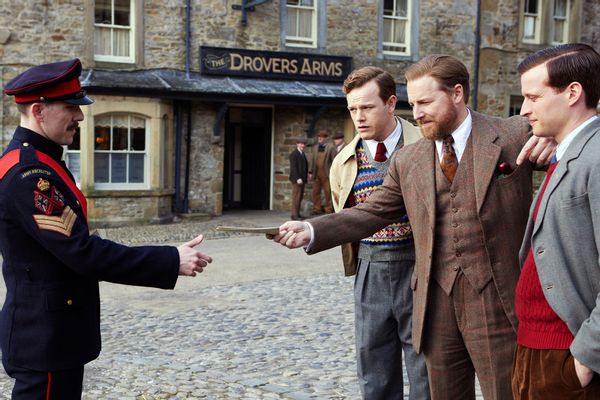
"Why not go go back and see what Siegfried went through then and how it's affecting him in the present? You understand what his fears are for James and Tristan."
Yeah, he's called up to the Army veterinary corps. The real-life character he's based on, Brian, also did, so it felt right that that's where [Tristan] goes. Even then he's following in Siegfried's footsteps, but he's doing it almost as his own man.
It was a really moving episode to shoot that actually. [Woodhouse] does a really brilliant performance of it – he's really measured in how he sort of keeps Tristan from almost letting his emotions out until the very, very end when he's on the train. I think it's a great performance by Callum.
When it comes to the veterinary corps, what we see Siegfried do earlier in the season, is care for war horses. Are those the only animals the corps treats?
I think it's still mainly horses in World War II. I know there's still some pigeons being used, but I think in the main, it would horses.
Speaking of Siegfried's part in the Great War, we did get a flashback to see him in action. Previously we had already learned of Mrs. Hall's sharpshooting experience. Here Siegfried is trying to help an injured war horse, all while shells are exploding and bullets are flying around them. Was that mainly drawn from things that Alf Wight had experienced or written about? Where did that scene come from?
That's very much our invention, actually. The Siegfried from the books is pretty much the same age as James, he's a year or two older. When we first formulated this series, we envisaged Skeldale House as a dysfunctional family with Mrs. Hall and Siegfried as the de facto mum and dad with James and Tristan as the boys in a way. So that meant Siegfried was older than the Siegfried from the books, which meant that he would have served in World War I given his age, so it felt that we had to build a backstory that worked with that.
I always thought it was interesting that his fascination and love of horses could have stemmed from somewhere. So back when we were creating our character for Series 1, we came up with this backstory not quite ever thinking we would necessarily see it. But then this year, wanting to push the series on and keep challenging ourselves to come up with with something different, we thought why not? Why not go go back and see what Siegfried went through then and how it's affecting him in the present? It's tied up as well with the death of his friend who's another vet who served and who [dies by] suicide, which obviously affects Siegfried very deeply. It felt the right time to flesh out that character with war looming on the horizon, as well to look back and see what he went through so you understand what his fears are for James and Tristan and everyone. It sets the stakes.
In the episode when Siegfried teaches the young boy the veterinary ropes and we find out about his relationship with children, we also see he has a rat named Vonolel. I don't believe that rat was in the books.
No, no it's not in the books. That rat is named after a famous horse or pony actually. It was a famous horse from a 19th century war [the Second Afghan War, 1878-'80].This pony basically carried someone [Lord Roberts] through 300 miles [Kabul to Kandahar].
Much of the episode Siegfried is trying to keep James and Tristan home, so much so that he doesn't really see Mrs. Hall until the end when she's kissing Gerald. What do you say about the fandom that's cropped up around wanting Mrs. Hall and Siegfried to get together?
I'm not really on social media, so I don't follow much of it at all. I love that the people love the show enough to want things for our characters and to almost have imagined worlds. And I think that is a sign that we're doing a good job because they clearly care about what happens to them.
Whether or not they ended up together, I don't know. Nothing's written yet. As far as the endpoints, we don't have a full stop written down at this stage. I'm not against people wanting things for the characters, but it's more the pressure that you're worried you might disappoint them. But I think that any decisions you make someone will be disappointed.
"[It] feels kind of mad that you've got this disease that can kill people, but people weren't forced to take action to stop it."
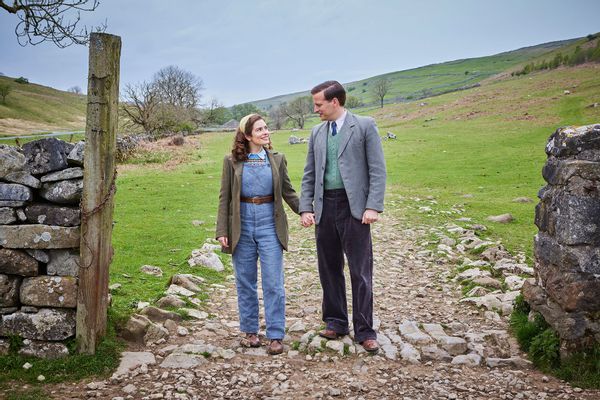
The main thing with TB was it was infecting children and adults. It was because it was in the milk. And any milk that wasn't pasteurized could potentially carry it, and that could kill people, and it did kill people. So that was the great fear with it.
But it was quite hard to get farmers on board the testing program. I mean, not being too on the nose . . . but it's kind of a story about COVID as well, in the sense that the idea of testing is for the greater good and to stop the spread, but it could also be a massive inconvenience to test. So they had to try and incentivize farmers to take part. Slowly it became law that they had to but at this stage it's on a voluntary basis, which feels kind of mad that you've got this disease that can kill people, but people weren't forced to take action to stop it until they were. It felt like a crusade for James at a time when he's feeling like he should be doing something for the greater good in regards to the war instead. It plays out in his veterinary work at home, but then even that is not enough for him.
Even in the Dales, even if the farmers are in a protected profession, it's hard for them not to be aware of the war. For Skeldale House, we see that they even take in a World War II evacuee, Eva Feldman (Ella Bernstein) during Christmas. What inspired this storyline?
I wanted to have an evacuee child there because it felt like there's a danger that an episode set during Christmas in wartime could be quite dark and melancholic. And it felt to me – especially with our characters, one of them about to leave – it felt like the episode could be quite a downer. So the intention was to have a child at Christmas, which means that everyone will have to try and bring the Christmas spirit at a time when perhaps they're not necessarily desperately able to. So that was the first instinct.
Then I got to talking with Colin Callender, executive producer with Playground, and his mother was Jewish, and it's kind of her story. She was evacuated to this family who was celebrating Christmas, and being Jewish, she'd never done it before. And so she was suddenly seeing all these new experiences and she got to try out Christmas and the fun of that. That's what the germs of the story were and then from there, it's like, what is the truth for that character? Despite wanting to have a good time and enjoy Christmas, it's not her world, and they're not her people. So ultimately, there's a bittersweetness to her story.
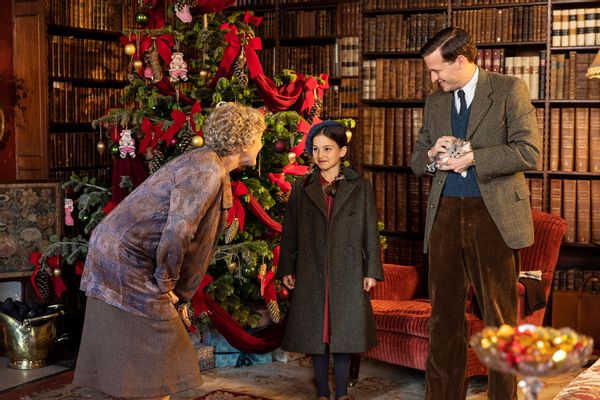
"Wizard of Oz" had come out that year [1939]. And I thought it would be interesting to get a sense of bringing popular culture into the show. There's this girl who's away from home and wants to go home – it kind of felt that all those things came together with the idea, "There's no place like home," and then the slippers not working. It's that childhood naivete, which is hopefully surprising and heartbreaking to the audience.
We see Mrs. Pumphrey (Patricia Hodge) want to do more for the war effort. How much of what she wants to do – opening up her house and the victory garden – is from the book and how much of it is what research tells you wealthy people did during the war?
A little bit of both. The house that we shoot in for Mrs. Pumphrey's, during the war that was turned into a school for evacuee kids and run by volunteers, a group of nuns. And then a lot of gardens were dug up to start growing veg. There was a whole Dig for Victory campaign. All of it was driven by my research. I don't think there's much reference to it in the books. Alf Wight makes a conscious decision not to dwell too much on the war actually in his book. There is a section in the fourth book where where James joins the RAF, but apart from that, it's very much contained in that section of his stories.
I'm always happy that there's more "All Creatures" coming. When does Season 4 start shooting again?
We start filming in four weeks' time, three weeks' time. The scripts have been written. We're about to launch into it again.







